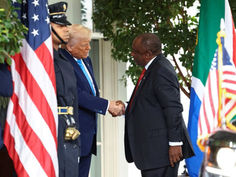Tech Billionaires and Space Diplomacy
- Rahmani Khoshnaw

- May 6, 2025
- 3 min read
Khoshnaw Rahmani, JadeTimes Staff
K. Rahmani is a Jadetimes news reporter covering Politics.

Outer space, once the singular domain of state ambition and national prestige, now finds itself at the nexus of private ingenuity and unrestrained entrepreneurial daring. In recent decades, an unexpected cadre of tech billionaires has stepped into the void traditionally occupied by governmental agencies, unsettling long-held assumptions about who—indeed what—wields power beyond Earth’s confines. These innovators are not merely launching rockets; they are crafting a new lexicon of diplomacy, one defined by digital contracts, algorithmic governance, and ethically ambiguous ventures that defy conventional international law.
Consider, for example, the peculiar convergence of private aerospace ambition with public regulatory gaps: as tech titans invest billions into interplanetary colonization projects and satellite megaconstellations, they simultaneously challenge the established order of space governance. The emergent paradigm forces us to ask: When individual visionaries recast space as a realm for privately coded treaties and market-driven exploration, how do we reconcile cosmic ambition with collective accountability? This article embarks on an interdisciplinary inquiry—melding political theory, ethics, and technology studies—to explore how the unprecedented rise of tech billionaires is redrawing our diplomatic maps and redefining what it means to govern the final frontier.
I. Historical Context
Historically, outer space was the preserve of superpower rivalry. Treaties like the Outer Space Treaty of 1967 established space as a global commons, governed solely by state actors.
During the Cold War, national agencies set a deliberate pace for exploration. The domain was seen as a symbol of national prestige and technological progress.
II. Emergence of the Private Sector
Today, private capital is challenging this state-led paradigm. Tech billionaires invest billions in reusable rocketry and large-scale satellite networks.
The global space economy is valued at nearly USD 450 billion. Projections estimate it will exceed USD 1 trillion by the 2040s—a testament to the transformation underway.
Their ventures blend corporate objectives with public policy influence. A shift is evident: private enterprise now plays a role once reserved for nation-states, making space a contested arena of commerce and diplomacy.
III. New Diplomatic Mechanisms
Digital platforms have become new diplomatic corridors. Tech magnates utilize social media to announce policy stances and influence public opinion on space governance.
These rapid, algorithm-driven communications defy traditional slow-moving diplomatic channels. The instant spread of ideas compels governments and international agencies to adapt quickly.
The private sector’s agility challenges outdated protocols. Digital charisma and nonstop connectivity now define a modern diplomatic toolkit that evolves much faster than official treaties.
IV. Ethical and Regulatory Challenges
This dynamic raises profound ethical questions. When private billionaires dictate space agendas, who safeguards global interests?
Existing treaties now appear inadequate. The Outer Space Treaty did not anticipate conglomerates setting their own rules or monopolizing orbital infrastructures.
Algorithmic decision-making introduces additional complexities. Proprietary data and opaque corporate governance can skew accountability—a risk that may undermine global equity in space resource management.
These ethical dilemmas necessitate interdisciplinary inquiry. Lawmakers, ethicists, and technologists must collaborate to reform regulations that balance innovation with public responsibility.
V. Future Prospects
Looking ahead, a new diplomatic framework is critical. Traditional statecraft is under pressure from agile, market-driven entities challenging established norms.
A constructive international dialogue is essential. Government leaders, academic experts, and private innovators must forge updated protocols to manage space as a shared resource.
The final frontier now embodies both groundbreaking potential and significant risk. Private visions can unlock unprecedented opportunities, yet they also raise the specter of unchecked power and inequity.
Tech billionaires are recasting the rules of space engagement. Their ventures force us to rethink diplomacy in an era where private capital and cosmic ambition collide.
The challenge ahead is to craft a governance model that respects innovation while ensuring equitable access. The final frontier beckons as an arena not only for discovery but also for redefining global responsibility.
As this new space age unfolds, the interplay of wealth, ethics, and policy will determine whether the cosmos can truly remain a shared asset—a realm of collaboration rather than conquest.











































Comments